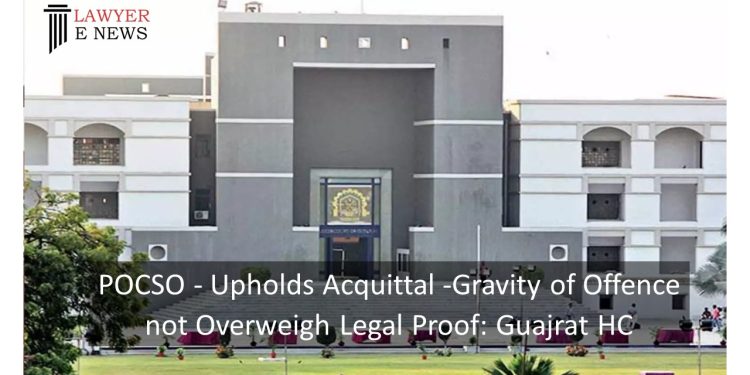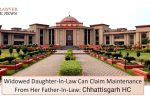POCSO – Upholds Acquittal -Gravity of Offence not Overweigh Legal Proof: Gujarat HC

D.D:04-07-2022
The Gujarat High Court recently rejected the State Government’s appeal challenging the acquittal of an individual charged under the POCSO Act for lack of evidence. A bench composed of Justices SH Vora and Rajendran Sareen stated, ” “Here in this case, it should be noted that the complainant initially accused the respondent accused of sexually assaulting her victim daughter, and just three or four days later, she accused her own husband of sexually assaulting her victim daughter. Thus, within a span of four days, the complainant presented two contradictory accounts against two different individuals, both of which are based on suspicion and doubt: the present respondent accused and her husband. Therefore, mere suspicion and doubt cannot be regarded as solid and convincing evidence to support the allegations.”
The court reiterated that suspicion, regardless of its strength, cannot substitute for proof. Strong suspicion, coincidence, and grave doubt cannot substitute for evidence. It is always the responsibility of the courts to ensure that legal evidence is not viewed with suspicion.
Respondent-Accused was charged with violations of Section 376 of the IPC and Sections 5(F)(M) and 6 of the POCSO Act. Within three to four days, the victim’s mother (the Complainant) made allegations against the school bus driver and her husband in this case.
The High Court noted that, according to the doctor, the victim’s hymen and perineum were red, but there were no injuries or bleeding. The Doctor acknowledged that the redness could have a variety of causes. It was also noted that the school teacher in charge of the bus service had no knowledge of the incident and had not received any complaints against the accused from parents. The Panchas had also become hostile and did not support the Prosecution’s case.
In this context, the court observed that the Complainant had initially accused the bus driver of sexually assaulting her daughter, and then she accused her own husband. Thus, the complainant presented two contradictory accounts within a span of four days. As such, the Bench remarked, “mere suspicion and doubt cannot be regarded as solid and convincing evidence to prove the allegations.”
In addition, it was determined that when the complainant took the victim to the hospital, the doctor did not accept the case, and the complainant subsequently went to the police station. The complaint made no mention of this fact. In addition, the Complainant’s view that the Accused’s conduct was deplorable was not expressed in the complaint or during cross-examination. The allegation that the Accused had a “loose character” was not included in the complaint, but it was included in the deposition.
“This type of enhancement was made by the complainant in her deposition, and it is supported by the investigating officer’s deposition. All of the aforementioned facts, as stated by the complainant in her deposition, were not mentioned in her complaint or in her statement. As such, the complainant’s dependability and credibility are suspect “declared the Court.
In addition, the Bench did not rule out the possibility of a relationship between the Complainant and the Accused and an issue of settling scores based on previous telephone conversations. Allegations, such as that the victim was sitting on the accused’s lap, were not supported by any witnesses, including the daily bus-riding teacher.
Consequently, the Bench determined that the Trial Court had correctly acquitted the Accused and that the Trial Court had not committed any error or acted illegally.
“There is no doubt that the alleged offence is heinous, but the gravity of the alleged offence cannot by itself outweigh the legal proof,” it concluded.
STATE OF GUJARAT
Versus
HASMUKHBHAI @ HARSHADBHAI DAHYABHAI MAKWANA






